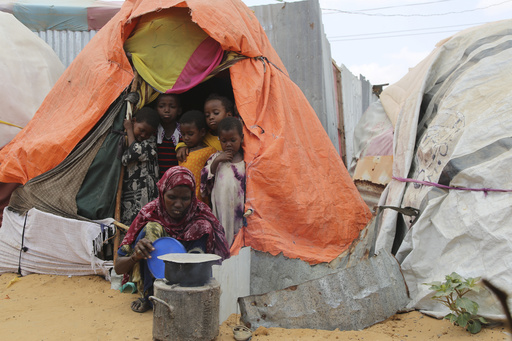
MOGADISHU, Somalia — A significant number of internally displaced individuals inhabit a bleak makeshift camp on the outskirts of Somalia’s capital. Under the relentless sun, these vulnerable people find themselves uncertain about the availability of food assistance and medical care following a decision by U.S. President Donald Trump to halt a majority of foreign aid. This executive order is set to take effect for a period of 90 days from January 20, raising concerns that it could lead to a collapse of the humanitarian aid framework that many rely on to survive.
The U.S. is the largest provider of foreign aid globally, allocating approximately $60 billion for the year 2023, which constitutes around 1% of the total U.S. budget. Somalia, located in the Horn of Africa, is particularly reliant on international assistance due to ongoing challenges, including a persistent Islamist insurgency and widespread displacement caused by conflict, with around 3 million individuals affected according to the UN refugee agency. The country struggles against natural disasters such as drought, exacerbating food insecurity.
In 2021, the U.S. Agency for International Development (USAID) allocated $369 million to Somalia, funding critical services ranging from emergency nutrition to sanitation, through both governmental and non-governmental organizations. However, Ayan Ali Hussein, who leads the Dooxdoox displacement camp near Mogadishu, reported that Trump’s order led to immediate shut-downs for USAID affiliates, effectively halting essential services.
Hussein highlighted the dire consequences of the aid freeze, stating, “Suddenly, there are no facilities to treat malnourished children.” Access to services for women who faced gender-based violence has also been severely impacted, depriving them of counseling, support, and essential medical care. With her camp home to nearly 8,000 households, Hussein lamented that residents may soon lack vital items, like tarpaulins for basic shelter.
The suspension of funding has created a substantial gap in the support systems for those in need. Ruqiya Abdulle Ubeyd, an elderly resident and mother of eight, expressed her dismay over the announcement and urged the U.S. government to restore the assistance that was previously provided.
Additionally, those requiring urgent medical attention, including individuals living with HIV, are facing difficulties as the freeze has disrupted the operations of almost all non-governmental organizations in Somalia. Dr. Abdiqani Sheikh Omar, founder of the Somali Young Doctors Association (SOYDA), a key provider of medical services in these camps, indicated that the unexpected nature of Trump’s decree has jeopardized ongoing health initiatives.
The disruptions have implications for anticipated support; SOYDA was scheduled to receive $125 million in USAID for 2025, which could now be rendered ineffective, shifting their focus to prioritizing critical nutrition and hygiene programs in light of resource constraints. The financial instability also means that many staff members may lose their jobs, forcing the organization to temporarily rely on volunteer healthcare professionals to fill staffing shortages.
Furthermore, SOYDA plays a crucial role in providing medication for those who cannot afford it. Hussein Abikar, a father of five residing in the camp, expressed his frustration, stating, “Whenever our children got sick, we would go directly to the SODYA center for help. There’s no alternative source of support for us.”
In this uncertain and precarious environment, the repercussions of aid cuts continue to unfold, sealing the fate of countless families who are now left to navigate an increasingly challenging landscape.

